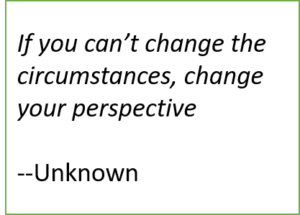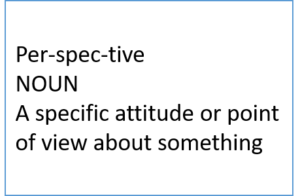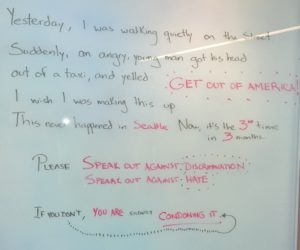Archive for December, 2016
Losing Perspective and Getting it Back
 When we’re in the middle of challenging circumstances at work, it is easy to lose perspective.
When we’re in the middle of challenging circumstances at work, it is easy to lose perspective.
Under significant stress, we get tunnel vision. When our adrenal glands activate our flight or fight response, we narrow our focus to better deal with the threat at hand.
That’s great when we’re faced with immediate bodily harm. It’s not helpful when our bodies feel threatened every time we go to work.
When our attention is tightly focused on the stressful problem we’re experiencing, our ability to come up with solutions is reduced. Our brains draw on what we’ve already learned and experienced.
For example, maybe every time your previous manager yelled at you about a project you could calm them down by saying “Yes, I’ll get right to it”. Now your brain might be stuck on finding similar solutions, even if that approach doesn’t work at all with your current boss.
When you’re on high alert at work from constant stress, your natural flight or fight response is probably not going to help you deal with your manager, either. When they berate and demean you in front of your colleagues, you might feel an urge to throw a punch or to run out of the building. If you’re in control of your behavior, you’re most likely to freeze instead.
Many of us have felt stuck in a bad job. When we’re in a toxic workplace for a long time, our narrowed perspective can seem like our only reality. It might seem like there aren’t any good solutions. For every idea, we think of reasons why it won’t work. At times like this our best moments are when we’re distracted from thinking about our jobs.
How do we get perspective back once it’s lost?
The best advice I’ve learned is from the book Good to Great, by Jim Collins. In chapter four, Collins interviewed retired Vice Admiral Jim Stockdale, who survived nearly eight years as a prisoner of war in Vietnam. As he described his survival, Stockdale said, “You must never confuse faith that you will prevail in the end—which you can never afford to lose—with the discipline to confront the most brutal facts of your current reality, whatever they might be.”
Stockdale had an unwavering belief that he would get out of captivity without ignoring the horrific situation he was in. He not only survived, but went on to complete his military career, work in academia, and write a book.
Having faith that you will prevail over your current work circumstances can be challenging when you feel like you’re in survival mode. But think of Stockdale. He was literally in survival mode and prevailed.
Can you believe that you will go on to a better job and leave your miserable one behind? I have talked to over a hundred people who have done this. They were call center employees, pizza deliverers, paralegals, tech workers, correction officers, teachers, government employees, among others.
 In my own career, I once felt trapped in a stressful job where I felt miserable most of the time. I believed that I could quit and find a different job, but I kept thinking of reasons not to. I worried that a new job would have worse benefits, or that I’d have a long commute, or that maybe the good parts of my job should outweigh the bad. I worried about the unknown.
In my own career, I once felt trapped in a stressful job where I felt miserable most of the time. I believed that I could quit and find a different job, but I kept thinking of reasons not to. I worried that a new job would have worse benefits, or that I’d have a long commute, or that maybe the good parts of my job should outweigh the bad. I worried about the unknown.
I had to convince myself to accept “the brutal facts of my current reality”. This meant accepting that there were positive parts of my job that I would miss: a project that I loved working on, many coworkers, and the salary and benefits. I also accepted that the job was wrong for me and I needed to leave it.
It took a long time for me to reach that point, but once I did, my perspective changed in an instant. At the time, I was home sick and didn’t have the energy to do much other than rest. I remember reclining on my couch, staring at the walls of my home, my sanctuary. I suddenly realized that a big reason why I stayed in my job was that it paid the mortgage and other bills.
In that moment, the trap was broken. I knew I could find other work that paid my living expenses, and that staying at my job wasn’t worth the negative impact it had on my wellbeing.
From that moment on, ideas for work came to me without trying. My mind opened to new options, I started writing again, and stopped worrying about paying the mortgage. I was confident in the many positive possibilities that my future could hold.
That was many years and mortgage payments ago. Since then I have been on a whirlwind of adventures in business and writing that I could not have imagined when I was clawing at solutions from inside a small, weary point of view.
Empathy. Intention. Action.
I read this article today. It’s about one black woman’s experience at school and work. I don’t have the same experiences as her – it’s not my story. I don’t know exactly how she feels. I can try to empathize, though, and think about my intentions and actions.
When the author describes teachers and colleagues making racial insults, I don’t know exactly what she thought and felt in those moments. I imagine she was angry and frustrated because those are the feelings that I had when reading about it. It brought to mind what it felt like when I’ve attempted to stand up for myself to people who had authority over me.
It doesn’t take much effort to try to empathize with someone who is hurt.
Taking action is harder than empathy because there’s risk.
At the end of the article, the author refers to an incident at a Seattle Starbucks that is described on KUOW’s site as A man shouts racial slurs in a Seattle Starbucks. The silence is deafening. In a crowded coffee shop, only one bystander offered support when two people were verbally attacked and spit on.
Maybe the other customers were afraid they would say or do the wrong thing, so they did nothing. Or they didn’t want to draw attention to themselves. Or they worried if they offered to help, they would be asked to provide assistance that they didn’t want to give.
There’s risk involved.
A couple of years ago I spent some time in an office building. One day I noticed writing on a whiteboard in a hallway. It said “Yesterday, I was walking quietly on the street. Suddenly, an angry young man got his head out of a taxi, and yelled, “Get out of America!” This never happened in Seattle. Now it’s the 3rd time in 3 months…Please speak out against discrimination. Speak out against hate. If you don’t, you are silently condoning it.”
Maybe the person wrote it hoping that people who haven’t experienced this kind of harassment will become more aware of it, have empathy for it, and offer support when they witness it.

The writing on the whiteboard was untouched for three days. Then a new message was added that said something like “I’m sorry this happened. I will speak up if I see it.” A couple other notes were added. The next day the whiteboard was blank again.
It wasn’t hard to empathize with the person who was yelled at from a taxi and asked us not to be silent bystanders.
It was hard, however, for that person’s coworkers to react – even through a few anonymous words on a white board.
It’s even harder to offer support to a stranger who’s been called racial slurs in a coffee shop.
These aren’t my experiences of hate speech. They aren’t my stories and it isn’t my place to end with a big statement about combating discrimination. But I can empathize. I can think about my intentions and actions. And maybe I can be brave enough to risk saying or doing something, even if it isn’t perfect.

Recent Comments